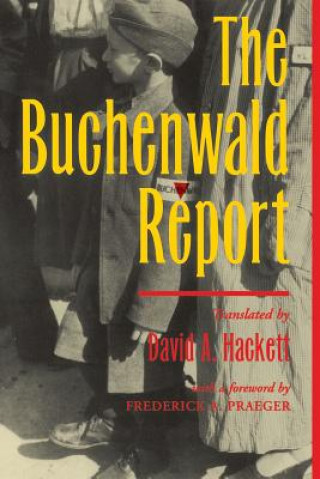
Doručení
Nákupní rádce





Nehodí se? Vůbec nevadí! U nás můžete do 30 dní vrátit
 Dárkový poukaz
V libovolné hodnotě
Dárkový poukaz
V libovolné hodnotě
S dárkovým poukazem nešlápnete vedle. Obdarovaný si za dárkový poukaz může vybrat cokoliv z naší nabídky.
Buchenwald Report
 Angličtina
Angličtina
 65 b
65 b
30 dní na vrácení zboží
Mohlo by vás také zajímat


In the closing weeks of World War II, advancing Allied armies uncovered the horror of the Nazi concentration camps. The first camp to be liberated in western Germany was Buchenwald, on April 11, 1945. Within days, a special team of German-speaking intelligence officers from the U.S. Army was dispatched to Buchenwald to interview the prisoners there. In the short time available to them before the inmates' final release from the camp, this team was to prepare a report to be used against the Nazis in future war crimes trials. Nowhere else was such a systematic effort made to talk with prisoners and record their firsthand knowledge of the daily life, structure, and functioning of a concentration camp. The result was an important and unique document, The Buchenwald Report.Shockingly, not long after the war ended The Buchenwald Report was almost lost forever. Only selected portions were entered as evidence at the Nuremberg trials. Professor Eugen Kogon, a prisoner at Buchenwald who assisted the Army specialists in conducting their interviews and writing the report, made use of the material gathered as a background source for his classic book, The Theory and Practice of Hell, but subsequently his copy was accidently destroyed. Thus the complete report was never published, and both the original document and a precious handful of copies gradually disappeared. Recently-more than four decades later-a single, faded carbon copy was discovered, apparently the only one still in existence. It is translated from German and presented here in book form, as its authors intended, for the first time.The book is divided into two parts. The first, the Main Report, formally presents the interview team's findings. It describes in detail the camp's history, how it was organized and functioned, who the prisoners were, how they lived, and how they were treated by their Nazi captors. This part of the report is based on the camp's own incriminating files and records as well as on information obtained from the prisoners.The second part, the Individual Reports, is the heart of the book. Here are the eyewitness accounts of the camp inmates, statements taken while they were still behind the same barbed wire that had held them for so many years. The prisoners relate events so recent, so painful, that they can only speak with strong emotions but often with great eloquence. The interview team had the foresight to take these accounts and organize them according to specific topics, for example forced labor, daily camp life, punishments, resistance, or SS guards. As a result, the book goes beyond simply a collection of individual stories, providing instead a well-rounded portrayal of every aspect of Buchenwald concentration camp from the prisoners' point of view.The Buchenwald Report is one of the most remarkable and important documents to emerge from the Holocaust and World War II. It is a deposition against the monstrous crimes of the Nazis, damning testimony provided by their intended victims in a final act of defiance. These are the voices of people courageous enough to tarry a while longer in hell, so that they could tell the world the truth at last. Perhaps they already sensed that, as Milan Kundera was to put it, "the struggle of man against power is the struggle of memory against forgetting." After fifty years, and too many lapses of memory, we know they were right.
Informace o knize
 Angličtina
Angličtina
Kategorie




 Jak nakupovat
Jak nakupovat




























